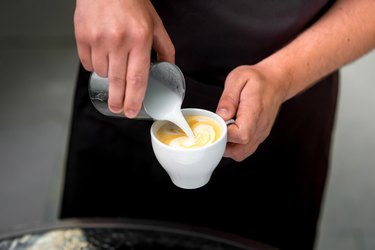
The gallbladder is a small sac-shaped organ primarily responsible for the digestion of fat using stored bile produced by the liver. Some of the most common gallbladder conditions include gallstones and cholecystitis, which is inflammation of the gallbladder. Milk, along with a variety of milk-based products such as cheese and ice cream, are known gastrointestinal allergens, according to the University of Maryland Medical Center. Eliminating these items from your diet could help curb symptoms associated with gallbladder conditions.
Gallstones
Video of the Day
Gallstones are solid masses of digestive fluids that form in the gallbladder. While it's not known what exactly causes the deposits to develop, MayoClinic.com reports that too much cholesterol or bilirubin, a byproduct of broken-down red blood cells, in the bile play a role. They can also occur if the gallbladder does not empty thoroughly, causing bile to concentrate. The BBC reports that a high-fat diet may also contribute to gallbladder stones. Whole milk, at 8 g of fat per serving, is about one-fifth of the recommended daily fat intake, according to MayoClinic.com. Instead of whole milk, drink reduced-fat or skim, which contain 0 to 5 g of fat.
Video of the Day
Cholecystitis
Cholecystitis is an inflammation of the gallbladder caused when gallstones interfere with the bile's ability to leave the sac, leading to a buildup. This painful condition can also occur from an infection, injury or tumor. Without proper treatment, tissue damage and tears can lead to a secondary infection, which could spread throughout the body. The National Institutes of Health warns that people with cholecystitis may be prone to gallstone attacks and should therefore follow a low-fat diet as well. According to Penn Medicine's division of gastrointestinal surgery, people with chronic cholecystitis may feel abdominal discomfort after eating fatty foods.
Gallbladder Surgery
About 50,000 Americans have gallbladder surgery each year, according to a 2009 "O" magazine article by David L. Katz, M.D. Following the procedure, Dr. Katz suggests eating more whole foods, gradually increasing fiber intake and reducing overall dietary fat. If diarrhea occurs after surgery, which happens in as many as 1 in 3 people, according to MayoClinic.com, Dr. Michael F. Picco suggests decreasing dairy intake, including milk.
Fat
The overriding theme in gallbladder health is to maintain a healthy weight and limit fat and saturated fat consumption. In 1997, researchers from the epidemiology department at the University of Pittsburgh reported that greater fat intake is a major cause of gallbladder disease. The gallbladder is responsible for breaking down fats, which can be painful for people with gallbladder diseases, and those who have had their gallbladder removed. Eliminating milk, or consuming low-fat or non-fat milk, can help ease symptoms. Unless patients consume less fat overall, however, including many types of dairy products, symptom relief is unlikely.